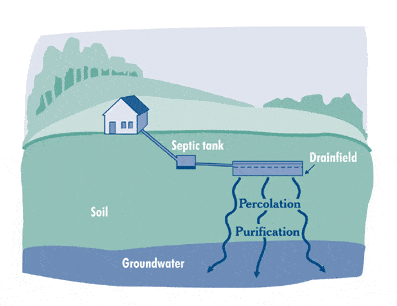Disclosure: This post contains affiliate links, meaning we may earn money or products from the companies mentioned in this post if you purchase a product through one of our links. An example would be Amazon.
How does a septic system fail inspection?
Scheduling a septic system inspection might feel like a medical visit. It is important to know how healthy your septic system is, but you worry about what the inspection will throw up. All the same, it is far better to go through an inspection and address any minor problems head-on than wait until a major mishap occurs.
So, how does a septic system fails inspection? A septic system may fail inspection if it has major underlying issues, like wastewater backing up or high levels of sludge. Structural problems and old age are other common reasons. Often, a septic system fails to pass an inspection if a lot of time has passed since the last inspection or if the system has not had an inspection before.
Keep reading to find out more on this subject, as well as to learn tips on how to pass a septic inspection and maintain your septic system in good shape.
Call Septic Service Pros 1.855-925-0760 For Service or Request a Quote
What is a Septic Inspection?
A septic inspection is a thorough investigation of a septic system. It is done to make sure the septic tank in question is in good health and to address any potential issues before they turn into a big problem.
You can choose a visual septic inspection or a more comprehensive one. If you want a detailed health report about your septic system and suspect there are some underlying issues with it, we recommend going for a comprehensive inspection.
During a visual inspect, the septic inspector will open the septic tank’s lid and take high-definition pictures. He or she may also run a dye test, which is done to locate any wastewater leakages.
A full inspection, on the other hands, involves everything that is done in a visual inspection and more. In addition to checking the waste water level inside the septic tank, the septic inspector will check whether the drainage system is working properly or not. Also, he or she will check whether the water is properly flowing from your house to the tank or not. The septic inspector is going to also check whether the water level in the septic tank increases when new wastewater enters it. Lastly, the inspector will check whether there is any backflow or not. Backflow is a serious problem, which can not only compromise the health of your septic tank but also your family’s health.
How Does a Septic System Fail Inspection?
More often than not, a septic system fails inspection because of lack of maintenance. If you do not get your tank inspected on schedule, there is a good chance it will not pass the next inspection. Most experts recommend homeowners to have their septic tank inspected at least once every few years. But if your tank is smaller in size or your water usage is considerably high, go for one septic system inspection every year.
Poor maintenance, however, is not the only reason why septic systems fail inspection. A design flaw can also cause your system to fail inspection, so can high groundwater tables. Excessive sloping is another reason why septic tanks fail inspection. It can cause both mechanical problems and contamination.
Find out more about selling a home with a failed inspection here.
Call Septic Service Pros 1.855-925-0760 For Service or Request a Quote
During a septic inspection, the septic inspector checks mainly three things related to wastewater management. These are:
- Sludge
The solid waste sitting at the bottom of your septic tank is called sludge. If the last pumping was done a long time ago, sludge levels could exceed the acceptable limits. Excessive sludge, in turn, can cause clogging. If your tank has high levels of sludge, the inspector is not likely to pass it unless the situation is remedied.
So, what’s the acceptable level of sludge in a septic tank?
Sludge should not be more than one-third of your tank’s volume. The most efficient way to away to it from building is by getting your septic tank pumped out regularly. Depending on your tank’s size, you should get it pumped out once every three to five years.
- Scum
Just like sludge, scum is bad for your septic tank’s health. Scum results from things like oil and grease that enters a septic tank. Because these things can kill the good bacteria thriving in your septic tank, their presence is unwanted. Lack of good bacteria, in turn will mean that solid waste will not get broken down properly, which will result in the buildup of sludge and consequently clogging.
Flow
Excessive sludge and scum can impinge the natural flow of your septic tank. This is not good news and can eventually lead to clogging and backups — two septic tank issues that every homeowner wants to avoid. If left unchecked, these issues can even cause the entire septic system to collapse. So, make sure your tank has a nice natural flow to it; otherwise passing a septic inspection may not be possible.
As said earlier, during a septic inspection, three things are checked mainly. These are scum, sludge, and flow. A serious issue in any one of them means your septic system will not pass the inspection. For that to happen, you must first rectify the underlying issue.
Here are some tips that help ensure your septic tank passes inspection:
- Do not use bleach and other harsh chemicals
- Avoid flooding the septic tank with excessive water
- Promptly address any leakage in the plumbing
- Make sure you do not send garbage disposable units or food down the drain
- Follow a septic pumping schedule
How Long Does a Septic Tank Inspection Take?
Septic tank inspection is usually not a lengthy process. In most cases, an inspection does not take more than two hours. That said, how much time does an inspection take depends on several factors. A bigger tank or a serious underlying issue with the system may delay the inspection. Likewise, the inspection may last more than two hours if you have a longer yard. Nonetheless, septic inspections rarely (if ever) exceed three hours.
As a homeowner, it may not be a bad idea to closely observe the inspection process. This may give you an opportunity to pick up tips regarding how to maintain your tank in good health.
Read more about what to do if your system fails inspection.
How Should I Prepare My Septic System for an Inspection?
- Choose a licensed septic service for the inspection.
- Have the necessary details about your septic tank handy, such as the age of the septic system, its design plan, and the time of the last inspection.
- Write down your concerns (if any).


